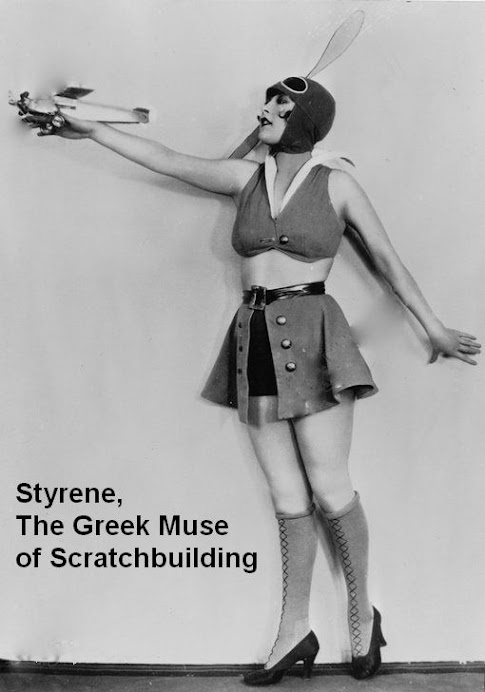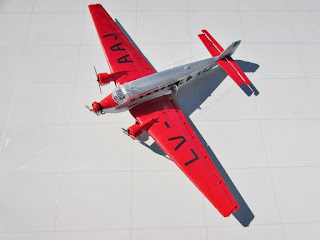Beautifully clunky, or clunkily beautiful, the Junkers Ju-52
is known by all.
The necessary set was commissioned from Arctic Decals, no model would exists without them.
Historical notes pertinent to the Argentinean machines and model
construction intricacies can be found in the building article:
A product of the great mind of Hugo Junkers -who the
despicable and utterly rotten nazis ousted of his own company and basically
pushed to death- the Ju-52 became a
symbol of roughness and endurance, flying even today.
I have chosen for this model a more uplifting role and
destiny, a nicer guise under which its industrial lines can be better
appreciated, with a colorful scheme used in the southern routes by Aeroposta Argentina, in
vivid red and metal to make it as conspicuous as possible during cold weather
there.
That high-vis scheme saved many lives on July 1946, since
Ibaté had a panne on the snow and ice during bad weather, but was quickly spotted
by another Aeroposta plane. It took a few days for a land-based rescue party to
arrive and evacuate the crew and passengers (during that time they stayed inside
the plane), and some more days of walking and horse-riding for all of them to
arrive to safety.
The plane was later repaired in situ, and eventually flown
off to continue its service.
The incredible saga of Aeropostale -and its successor
Aeroposta Argentina- is a wonderful tale of adventure and daring, a romantic
endeavor elevated to mythical proportions, and its pilots, French and
Argentinean, legendary for their skill and courage.
All of the available 1/72 kits of the Ju-52 need many
corrections to depict the truly civil version of the type, since the kits in
the market (and many of the converted real machines) are just ex-military
frames adapted to civil use (which poses for the modeler a doors and hatches issue).
So here it is, a strange metallic bird flying over the
Argentinean coastal and Patagonian landscapes, bravely enduring the harsh weather
conditions and the scarcity of resources, aptly and boldly flown by its pilots.





































































Very nice, I like the smart red & aluminium livery.
ReplyDeleteThanks!
DeleteIt's quite vibrant!
Beautiful, mon ami!!!!!
ReplyDeleteMerci beaucoup, cheri!
DeleteMe alegra que te guste.
Buen tino e investigación, y encima un trabajo hermoso... que más se puede decir. Felicitaciones! ^ ^
ReplyDelete(una observación un poco surrealista... "AAJ", son los bichos colorados de La Paternal!!... Este Junkers tuvo la camiseta puesta desde el principio..) Abrazotes..
Muchas gracias Matías. Viniendo de un maestro exquisito como vos, doble cumplido!
ReplyDeleteArgentinos Juniors!
Yo vivía en Gavilán, a dos cuadras ;-)
Buena conexión!
EXCELENTE, UNA COLORACION MUY ATRACTIVA. ARMANDO GIL.
ReplyDeleteGracias Armando, y un pedacito de historia alada!
DeleteExcelente trabajo! Muy buena recopilación de información para hacerlo. Me sirve de guía para empezar mi ju 52 patagonia. Tal vez haya alguna data de los colores de la matrícula de los primeros ya que no eran negras?
ReplyDeleteNuevamente felicitaciones y su trabajo me sirve como fuente de inspiración para los que amamos este hobby y la historia.
Saludos!
Muchas gracias, Fernando.
DeleteNo sabía que las matrículas eran al principio de otros color, gracias por el dato, siempre parace haber más para investigar!
Un saludo cordial, y puede usar cuando quiera la "contact form" en el blog para comunicarse por email (columna de la derecha, arriba).
Felicitaciones por el trabajo en tus modelos y de por mas interesante seleccion de temas, creo que coincidimos ampliamente, me gustan los racers, lo aviones que rompieron records y US Navy de los 20 al 55 en especial la era yellow wings, en este momento regresando al hobby con un a6m2 en 1/48 y proximamente varios racers de Williams Bross, lamentablemente un hereje de 1/48 y 1/32. Un saludo desde Montevideo.
ReplyDeleteAlain
Gracias Alain. A disfrutar del hobby!
Delete